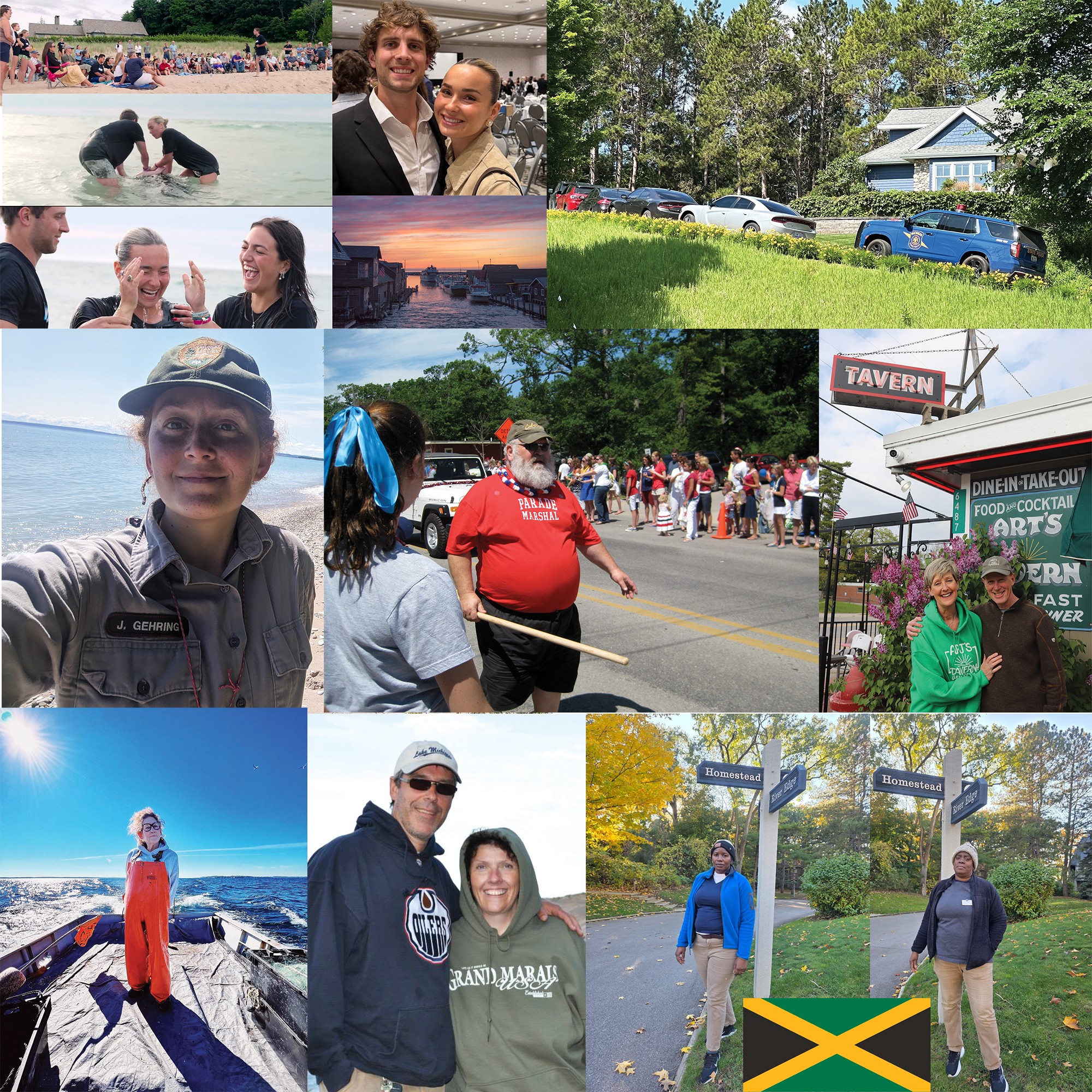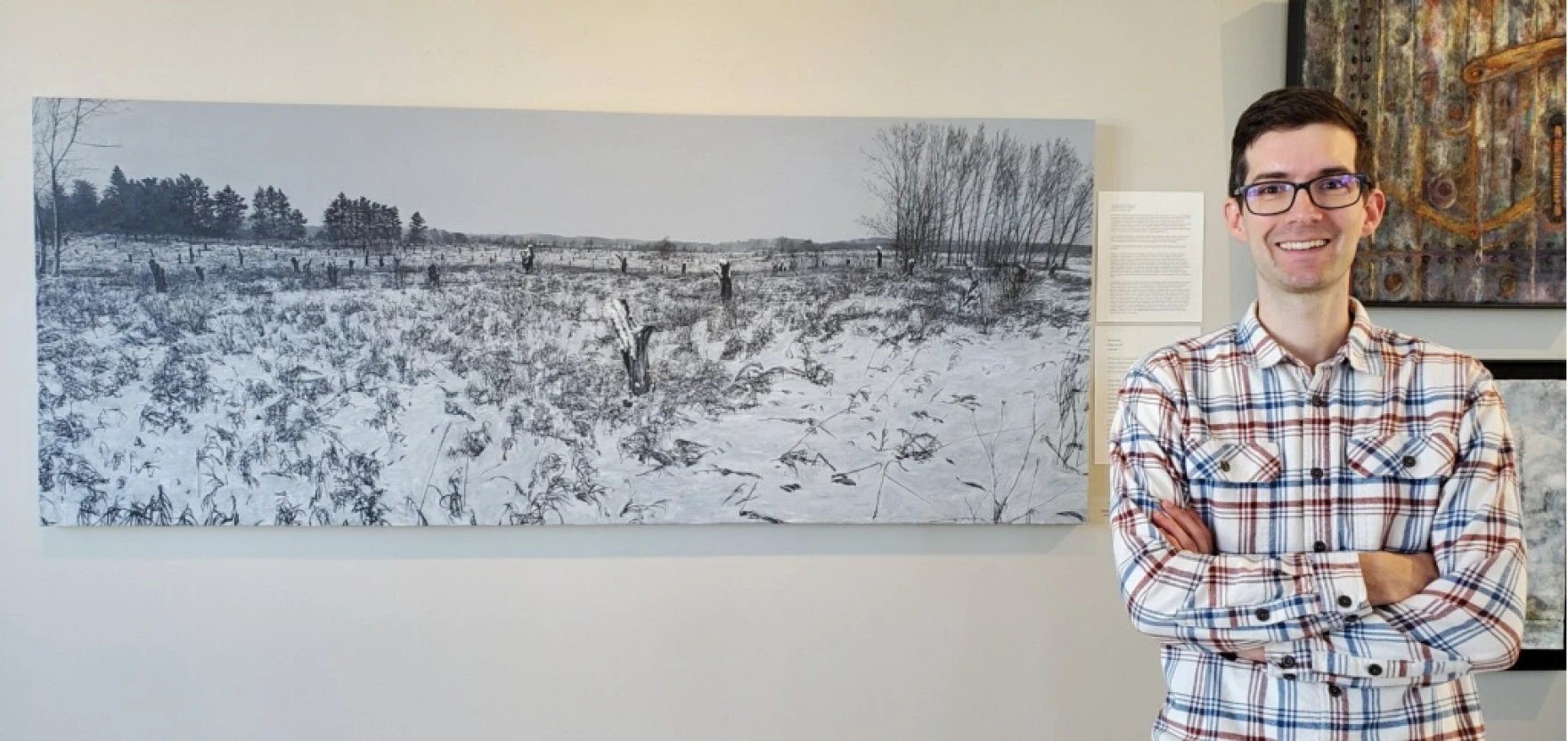The U.S. Supreme Court heard arguments on Tuesday, Feb. 24, about whether state or federal court will have the final say on the future of the controversial Line 5 pipeline, which carries crude oil and natural gas liquids across the Straits of Mackinac in Michigan. The case dates to a 2019 lawsuit by Michigan Attorney General Dana Nessel, who moved to shut down the pipeline by revoking the easement that allows it to cross the Straits, citing risks to the Great Lakes. (Over its 73-year lifetime, Line 5 has spilled over a million gallons of oil along its inland route.) A shutdown is supported by all 12 federally recognized tribes in Michigan, though they are not involved in the suit. Many tribal nations say the pipeline threatens their waters, treaty rights, and ways of life.
Posts
Scientists are asking for help from the public this winter to measure how thick the ice is on the Great Lakes and inland lakes. Data submitted by ice fishers and other people who spend time on frozen lakes could improve the models that forecast ice cover on the Great Lakes. Satellites do a good job at capturing how much ice there is, but not how thick it is, according to researchers at the Great Lakes Observing System (GLOS) in Ann Arbor. More data could give researchers insight as to how climate change is altering ice cover in the region and provide important safety information for people out on the ice.
Share this:
- Share on Facebook (Opens in new window) Facebook
- Share on X (Opens in new window) X
- Email a link to a friend (Opens in new window) Email
- Share on Reddit (Opens in new window) Reddit
- Share on Pinterest (Opens in new window) Pinterest
- Share on LinkedIn (Opens in new window) LinkedIn
- Print (Opens in new window) Print
- Share on Tumblr (Opens in new window) Tumblr
A controversial youth missionary group recruits inside Leland school and rattles the community; Michigan Attorney General Dana Nessel orders a raid of the Twin Flames Universe cult’s home near Suttons Bay; Sleeping Bear Dunes National Lakeshore leadership and staff face cuts and uncertainty under Trump and DOGE’s wrecking ball; Barb and Paul Olson acquire Glen Arbor’s iconic Art’s Tavern, and tribal fisherwoman Cindi John survives a mass stabbing at Walmart in Traverse City. Those were the most-read online stories of 2025 in the Glen Arbor Sun. Here’s a list of our top 10, by online views.
Share this:
- Share on Facebook (Opens in new window) Facebook
- Share on X (Opens in new window) X
- Email a link to a friend (Opens in new window) Email
- Share on Reddit (Opens in new window) Reddit
- Share on Pinterest (Opens in new window) Pinterest
- Share on LinkedIn (Opens in new window) LinkedIn
- Print (Opens in new window) Print
- Share on Tumblr (Opens in new window) Tumblr
This time of year, Jim Sweeney’s food plot in Leelanau County doesn’t look like much. It’s a small field with some sparse grasses and a deer blind off to the side. But, come fall, it’s “like a lush lawn,” Sweeney said. Sweeney mostly plants clover, beets and turnips these days. And in places where the soil’s a little better than in northwest Michigan, people plant corn. Baiting—putting out piles of food such as corn to attract deer for hunting—has been illegal in the Lower Peninsula since 2018 to prevent the spread of chronic wasting disease, a fatal, contagious brain disease that’s been found in 14 Lower Peninsula counties and in Dickinson County in the Upper Peninsula. But some think pro-baiting lawmakers have a shiny new bargaining chip: The DNR needs money.
Share this:
- Share on Facebook (Opens in new window) Facebook
- Share on X (Opens in new window) X
- Email a link to a friend (Opens in new window) Email
- Share on Reddit (Opens in new window) Reddit
- Share on Pinterest (Opens in new window) Pinterest
- Share on LinkedIn (Opens in new window) LinkedIn
- Print (Opens in new window) Print
- Share on Tumblr (Opens in new window) Tumblr
The Glen Arbor Arts Center is delighted to present the Kodak Quartet as their Musicians-in-Residence from June 10–21. Presented through a partnership between the Glen Arbor Arts Center’s Manitou Music Series and Interlochen Public Radio’s Sound Garden Project, this initiative focuses on planting classical music in unexpected places. The Kodak Quartet will bring its electrifying, genre-defying sound to the Glen Arbor area.
Share this:
- Share on Facebook (Opens in new window) Facebook
- Share on X (Opens in new window) X
- Email a link to a friend (Opens in new window) Email
- Share on Reddit (Opens in new window) Reddit
- Share on Pinterest (Opens in new window) Pinterest
- Share on LinkedIn (Opens in new window) LinkedIn
- Print (Opens in new window) Print
- Share on Tumblr (Opens in new window) Tumblr
The Glen Arbor Sun won six awards in four different categories from the Michigan Press Association’s 2024 Better Newspaper Contest. Winners included Jacob Wheeler, Tim Mulherin, Eric Carlson, and Daniel Wanschura, who won awards in the following categories: News Enterprise Reporting; Best Opinion; Sports Writing, and Public Service Award.
Share this:
- Share on Facebook (Opens in new window) Facebook
- Share on X (Opens in new window) X
- Email a link to a friend (Opens in new window) Email
- Share on Reddit (Opens in new window) Reddit
- Share on Pinterest (Opens in new window) Pinterest
- Share on LinkedIn (Opens in new window) LinkedIn
- Print (Opens in new window) Print
- Share on Tumblr (Opens in new window) Tumblr
This week is Earth Week, with Earth Day honored on Tuesday, April 22. It’s also National Park Week. Events in Leelanau County include a rally on Tuesday at 3 pm in Empire to support Sleeping Bear Dunes National Lakeshore—which has faced deep spending cuts and a hiring freeze by the Trump administration. Meanwhile, the Leelanau Conservancy offers opportunities each day this week, starting tomorrow, to join hikes, volunteer, attend a trivia night, and learn about local efforts to preserve trees.
Share this:
- Share on Facebook (Opens in new window) Facebook
- Share on X (Opens in new window) X
- Email a link to a friend (Opens in new window) Email
- Share on Reddit (Opens in new window) Reddit
- Share on Pinterest (Opens in new window) Pinterest
- Share on LinkedIn (Opens in new window) LinkedIn
- Print (Opens in new window) Print
- Share on Tumblr (Opens in new window) Tumblr
Last spring, a farmer in Centerville Township started applying a kind of fertilizer to his fields: Sewage pumped from septic tanks, often called “septage.” That kicked off a local fight about whether it’s legal to apply that septage waste and sparked concerns about contaminating the land and water. Neighbors and officials concerned about the use of septage to fertilize fields pointed to the township’s zoning ordinance which requires a special permit for septage application on land. But Centerville Township attorney Chris Bzdok said at a township board meeting in mid-March that their hands are tied when it comes to stopping the use of septic tank waste on a local farm. The site falls under the purview of the state Department of Environment, Great Lakes and Energy, which had granted a permit to use septage at that site. This story was originally reported by Interlochen Public Radio in mid-March.
Share this:
- Share on Facebook (Opens in new window) Facebook
- Share on X (Opens in new window) X
- Email a link to a friend (Opens in new window) Email
- Share on Reddit (Opens in new window) Reddit
- Share on Pinterest (Opens in new window) Pinterest
- Share on LinkedIn (Opens in new window) LinkedIn
- Print (Opens in new window) Print
- Share on Tumblr (Opens in new window) Tumblr
Artists in northern Michigan are known for landscape paintings: Green hills plunging into blue water, sunsets over Lake Michigan. But Nik Burkhart’s landscapes are a little different than most. His black and white paintings depict ripped out, cut down cherry orchards and ask questions about the region’s changing landscape. This story was adapted from a radio piece last month by Interlochen Public Radio.
Share this:
- Share on Facebook (Opens in new window) Facebook
- Share on X (Opens in new window) X
- Email a link to a friend (Opens in new window) Email
- Share on Reddit (Opens in new window) Reddit
- Share on Pinterest (Opens in new window) Pinterest
- Share on LinkedIn (Opens in new window) LinkedIn
- Print (Opens in new window) Print
- Share on Tumblr (Opens in new window) Tumblr
Lane Frame was 12 years old when he saw the Great Lakes for the first time. According to his aunt, Joy Frame, he was very excited. It was September 21, 2020. Lane was in Michigan on a family vacation. The family drove up from Tennessee, and stopped in Frankfort—a small, Lake Michigan beach community. Jewell Frame II—Lane’s uncle and Joy’s husband—thought the lake was the ocean. A vast difference between the smaller lakes they were used to. This story was adapted from Points North, a podcast by Interlochen Public Radio.
Share this:
- Share on Facebook (Opens in new window) Facebook
- Share on X (Opens in new window) X
- Email a link to a friend (Opens in new window) Email
- Share on Reddit (Opens in new window) Reddit
- Share on Pinterest (Opens in new window) Pinterest
- Share on LinkedIn (Opens in new window) LinkedIn
- Print (Opens in new window) Print
- Share on Tumblr (Opens in new window) Tumblr










